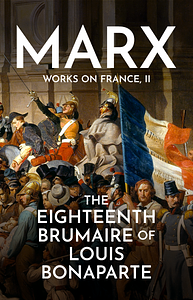Take a photo of a barcode or cover
funny
informative
fast-paced
challenging
dark
funny
informative
reflective
slow-paced
informative
reflective
medium-paced
Very insightful exploration into a topic I had little knowledge of. Louis Bonaparte definitely has a modern parallel that I think makes this work exceptionally relevant to today.
Es bastante útil consultar de vez en cuando ciertos nombres porque uno puede llegar a perderse. Es un resumen muy detallado y coetáneo de la toma del poder del emperador Napoleón III.
informative
inspiring
reflective
medium-paced
challenging
informative
slow-paced
adventurous
challenging
funny
informative
inspiring
reflective
tense
medium-paced
challenging
reflective
medium-paced
I think every line of this book's first chapter has been used as an epigraph for a piece of historical writing. The more you read the more it seems like the theoretical ur-text of almost every influential history book written since





